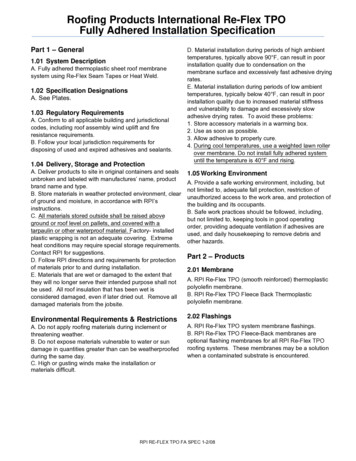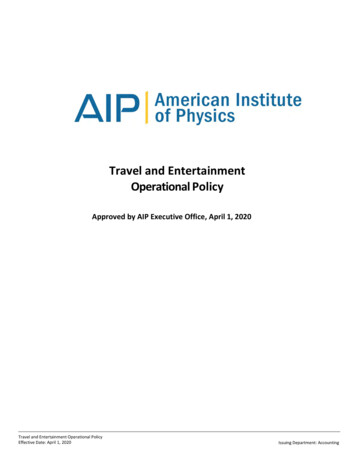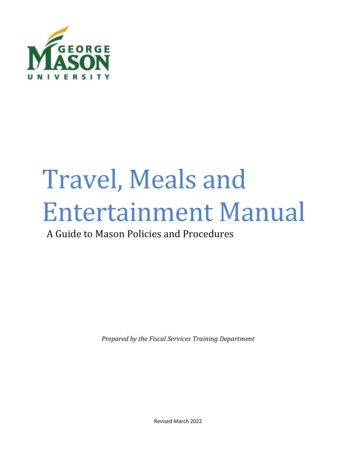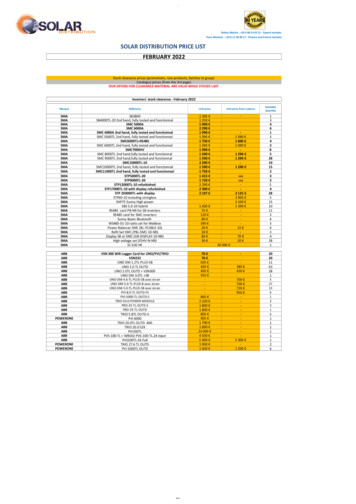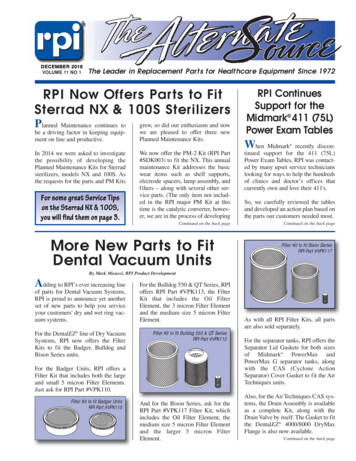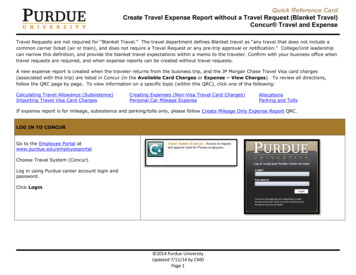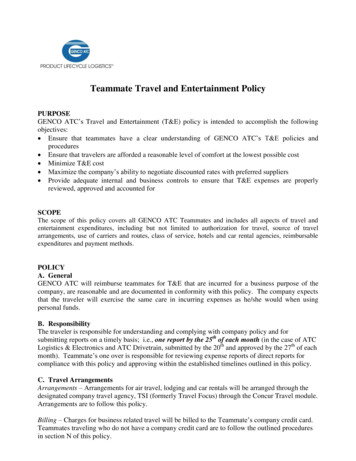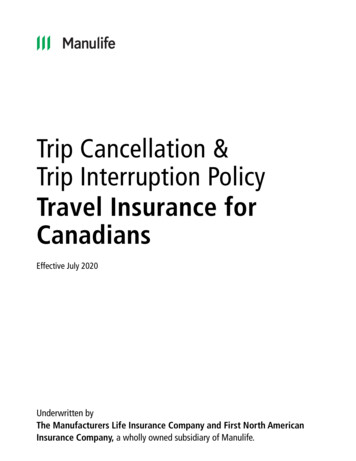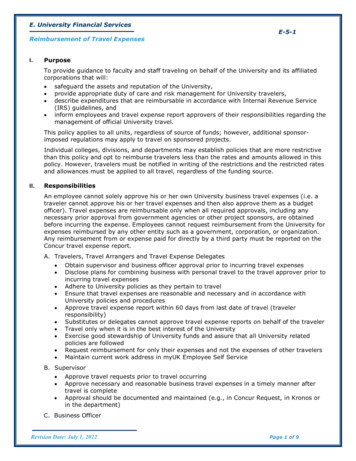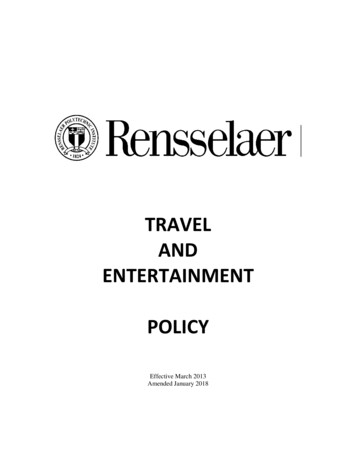
Transcription
TRAVELANDENTERTAINMENTPOLICYEffective March 2013Amended January 2018
Table of Contents1.0 Introduction1.01 Objective1.02 Roles and Responsibility1.03 Reimbursement1.04 Policy Review1.05 Expenses Outside of this Policy1.06 Exceptions to Policy1.07 Presidential Travel1.08 Alternatives to Travel2.0 Policy Guidelines2.01 General Procedures2.02 Travel Profile Creation2.03 Types of Travel and Expense2.03.1 Travel and Entertainment2.03.2 In-Town2.03.3 Group and Student2.03.4 Visitor2.04 Booking Travel Arrangements2.05 Settlement of Travel Charges2.06 Expense Submission and Approval2.07 Reimbursable Expenses2.08 Non-reimbursable Expenses2.09 Foreign Exchange Rates3.0 Travel and Entertainment Expenses3.01 Transportation3.01.1 Airfare3.01.2 Rail3.01.3 Rental Cars3.01.4 Personal Car Use3.01.5 Taxi and Other3.01.6 Commuting3.01.7 Limousine and Private Vehicles3.02 Lodging3.03 Personal Meals3.04 Business Meals and Entertainment
4.05.06.07.08.09.03.05 Incidentals3.06 Conference Registration3.07 Per Diem Travel Allowances3.08 Cash Advances3.09 Spouse Travel3.10 Gratuities3.11 Employee Events/GiftsIn-Town Expenses4.01 Transportation4.02 Business Meals and EntertainmentGroup and Student Travel and Expenses5.01 General Group Travel5.02 Athletics Group Travel5.03 Student Union Group Travel5.04 Non – Group Student TravelVisitor Travel and Expenses6.01 Visitors6.02 Non-Resident AliensRisk Management7.01 Travelers traveling together7.02 International Travel Advisories7.03 Health Precautions/Immunizations7.04 Worldwide Emergency Assistance Services7.05 Illness During Travel7.06 General Travel Insurance7.07 Personal PropertyTravel Charged to Sponsored ResearchForeign Travel to Countries Subject to US Government Sanctions
1.0INTRODUCTION1.01 ObjectiveThe objective of this policy is to provide guidance to travelers and approvers of expense reports on theInstitute’s policy and procedures for travel and entertainment (T&E) expenses, including allowableexpenses, and to: Ensure all travelers have a clear and consistent understanding of policies and procedures forthe different types of T&E expenses, including travel expenses, in-town expenses and groupand meeting expenses. Inform travelers of their responsibilities to control and report T&E expenses. Maximize the Institute’s ability to negotiate discounted rates with preferred suppliers andreduce travel expenses. Ensure that authorized expenditures meet and comply with all requirements for the mostfavorable tax and expense treatment. Comply with IRS business expense deductibility substantiation.Rensselaer’s preferred travel agency, Direct Travel will assist in all of our travel needs, and Concur willprovide a travel management system that will allow for online booking and automated expensereporting. Direct Travel will work in conjunction with Concur to create a streamlined automated travelsolution.The use of these partners will be expected by all travelers. The use of one preferred travel agencyprovides benefit to both the Institute and the traveler. These benefits include, but are not limited to: Discounted volume pricing for trip booking. Access to NYS Contract Pricing The ability to collect travel spend data that can be used to negotiate discounted preferredrates with Airlines and Hotel chains. Crisis management technology that tracks and locates all travelers in the case of anemergency. Automated flow of certain expense and receipt requirements into the traveler’s expensereport saving time for the traveler in submission.1.02 Roles and ResponsibilityEach traveler has stewardship responsibility for managing travel and related expenses, but in particular: Individuals with access to the Concur system have the responsibility of keeping their logininformation secure. Login and passwords should never be given to another individual. Travelers are responsible for reading, understanding and complying with this policy, includingadherence to expense reporting requirements. Business/Financial Managers or Administrators with budget responsibility are responsible forreviewing all expense reports for accuracy and compliance with policy and ensuring appropriatefunds are expensed. Supervisors are responsible for reviewing and approving all expense reports for accuracy,compliance, and appropriate business purpose prior to submission. Individuals traveling on restricted contracts are responsible to know the specific rules relating tothe contract and ensure compliance. Payment procedures must follow the rules of the fundingagencies if the travel is to be charged to an entity other than the Institute.
The Controller’s Office is responsible for the establishment, maintenance, revision andpublication of this policy and the administration of all processes and procedures needed toensure compliance with this policy.1.03 ReimbursementThe Institute will reimburse travelers for all reasonable and necessary expenses while travelingon authorized Rensselaer business that are in compliance with the guidelines of this Policy. Ifthe traveler receives reimbursement from another agency for expenses settled by Rensselaer,the traveler is expected to reimburse the Institute in a timely manner.Rensselaer assumes no obligation to reimburse travelers for expenses that are not incompliance with this policy.Travelers and/or Supervisors who do not comply with this policy may be subject to delay orwithholding of reimbursement and / or disciplinary action, up to and including termination. 1.04 Policy ReviewThis policy will be reviewed annually or as required, in order to ensure that the terms arecurrent, fair, and representative of relevant Institute and industry conditions.Rensselaer reserves the right to change this policy at any time, without prior notice.1.05 Expenses Outside of this PolicyRelocation expenditures are not covered by this policy.Employees should contact the Office of Human Resources for detailed information on relocationexpense reimbursement guidelines. Relocation expenditures include costs associated with premove trips to locate new living quarters and expenses associated with the transfer(transportation, lodging, meals, etc.) of new and existing employees and their dependents, andtemporary living allowances. These expenses must be reviewed for reporting and taxability bythe Payroll Office.1.06 Exceptions to PolicyExceptions, deviations or reimbursements for expenses by travelers that are not in compliancewith this policy require prior written approval.If an exception is warranted, it must be justified by the Institute and documented on a case-bycase basis. Documentation with the appropriate approval signature(s) must accompany theexpense report in all exception cases. Required Approvals Approval for administrative staff must be provided by each respective division’s VicePresident/CIO/Provost and concurred with by the Controller’s Office. In the case of faculty, approval must be provided by the respective Dean and concurredwith by the Controller’s Office. In the case of Deans, approval must be provided by the Provost and concurred with bythe President and Controller’s Office. For Cabinet Members, approval must be provided by the President, after having beenconcurred with by the Controller’s Office.1.07 Presidential TravelGuidelines for Presidential travel will be based on the terms of the President’s employment contract.
1.08 Alternatives to TravelTele- and video-conferencing are effective alternatives to travel and represent an opportunity tosignificantly reduce travel costs. Travelers should consider if the business objective can best beaccomplished through the use of a teleconference or videoconference.2.0POLICY GUIDELINES2.01 General ProceduresIt is Rensselaer’s policy to reimburse travelers for ordinary, necessary and reasonable travel andentertainment expenses when directly connected with or pertaining to the transaction ofInstitute business.Travelers are expected to exercise prudent business judgment regarding expenses covered bythis policy.When submitting expense reports for claim reimbursement, travelers are expected to neitherlose nor gain financially. 2.02 Travel Profile CreationA travel profile must be created for each traveler, travel arranger and travel approver in Concurbefore the Institute employee can book a trip, submit an expense report, or approve an expensereport.A profile application must be completed before this setup can occur.The profile application can be found on the Finance website. All required data must becompleted for the profile application to be accepted.2.03 Types of Travel and ExpenseThese Guidelines classify T&E expenses in four categories: Travel and Entertainment expensesIn-town expensesGroup and Student travel and expensesVisitor travel and expensesEach category is separately addressed in detail in the following sections, which include a discussionof the appropriate policy guidelines. The categories are broadly defined as follows:2.03.1 Travel and Entertainment ExpensesTravel expenses are incurred while traveling away from home on official Institute business andinclude transportation, lodging, meals and other miscellaneous expenditures.Theseexpenditures must be reasonable and necessary in the conduct of Institute business and directlyattributable to it. Travel in this category will most likely occur over a period of more than oneday; however day trips to NYC, DC, Hartford or Massachusetts would be an example of a oneday trip that would fall into this category.
2.03.2 In-town ExpensesIn-town expenses are expenditures incurred by the traveler in his/her home city (Troy, LakeGeorge, Hartford) for business meals, entertainment, in-town transportation, and other itemsnecessary for conducting business.2.03.3 Group and Student Travel and ExpensesAll group travel and arrangements must be booked through the Travel Agency. Group expensesare for ten or more Institute travelers and/or students. Expenses may include, but are notlimited to transportation, lodging, hotel meals, equipment rental, meeting rooms, groupentertainment and group services.Student travel requires pre-approval by an authorized Institute employee.2.03.4 Visitor Travel and ExpensesVisitor travel is any and all travel by a non-Rensselaer employee or student incurred to benefitRensselaer and represents an appropriate institutional expense.2.04 Booking Travel ArrangementsA travel relationship exists with Direct Travel and Concur Technologies, in order to facilitate the bookingof all travel needs at Rensselaer. It is expected (required) that all travelers will use both companies infulfillment of their travel needs.When booking travel arrangements, travelers have two options: Call the travel agency below and have an agent book the arrangements.Email: cttravel@dt.comToll-Free Phone: 866-492-9839 opt 2 for Domestic Corporate opt 3 for International CorporateAFTERHOURS:866-492-9839 OPT 8 (FOR CALLERS OUTSIDETHE USA CALL COLLECT 1-203-787-6223)There is no charge for after hours or emergency changes. Book the arrangements online without agent assistance using the Concur Travel tool. Onlinebookings can be made at https://concursolutions.com Both of these options are interchangeable. If arrangements are booked with the agent they areavailable to the traveler online and if booked online, the agent will be able to see the itinerary aswell. For group travel please refer to the Group Travel section of the policy.2.05 Settlement of Travel ChargesBusiness Travel Accounts have been set up to fulfill the payment of all airline (excludingbaggage fees), rail, and hotel (including parking, internet, phone and meals charged to the
2.06 room) expenses booked with either the travel agency or through the Concur Travel onlinebooking tool. Travelers will not be expected to pay out-of-pocket for these types of travelexpenses.The majority of travelers will not be issued a Rensselaer travel card. Travel expenses notedabove will be paid through the virtual accounts. The traveler is therefore expected to pay out ofpocket for any remaining travel expenses and receive reimbursement for those expenses.Examples of out-of-pocket expenses include meals (not charged to room), car rentals, andincidentals.A Rensselaer travel card will be issued to a defined group of travelers for their Rensselaer travel.Use of these cards will be granted by the President. To determine eligibility for this type ofcard, please contact the Controller’s Office.Expense Submission and ApprovalAll travelers will be expected (required) to submit expense reports electronically utilizing theConcur Expense tool.Approvers are responsible for ensuring that all expenses are appropriately described,documented, and meet the requirements set forth by this policy.All expenditures and advances should be accounted for on an expense report on a current basis,within 30 days of the trip/entertainment conclusion. Each expense report must include anexplanation of the business purpose.All expenditures paid for with one of the established virtual card programs must be submittedon an expense report within 120 days of when the expense was incurred or the value of theexpenditure will be added to the traveler’s taxable income.All out-of-pocket travel reimbursements must be processed through Concur within 120 days ofwhen the expense was incurred. All out-of-pocket general purchase reimbursement must beprocessed through Concur within 30 days of when the expense was incurred. Any out-ofpocket expense older than these timeframes will not be reimbursed.It is important to select the appropriate Expense Type within Concur, as the expense type drivesthe account code.To comply with Internal Revenue Code and regulation substantiation requirements, adequateand detailed records must be maintained which list the necessary elements required to supportthe various T&E expenses. The records must be made contemporaneously with the incurrenceof the expenditure, i.e., at the time when the traveler has full knowledge of each element of theexpenditures.ReceiptsTravel and entertainment expenses 35 or greater require a receipt (regardless of paymentmethod.)Purchases submitted for reimbursement, (not relating to travel or entertainment) require areceipt at any dollar value.Receipts can be attached at the line level or the report level of the Concur expense report. If a required receipt is missing, an explanation must be recorded in the comments fieldon the expense report at the line level. It is at the discretion of the approver (and Controller’s Office) as to the acceptance ofthe explanation and ultimately the approval or disapproval of the expense.
Picture image receipts can be uploaded into Concur through the use of a Concur App.Apps are available for the iPhone, iPad, Blackberry and Android.The following is a list of expenditures that require detailed receipts (if 35 or greater).Depending on the method of payment and the vendor’s electronic capabilities, an e-receipt withthe required information may automatically be fed into your expense report via the system. Ifthe e-receipt is not present it is the responsibility of the traveler to attach the required receipt.Air/Rail Travel – the detailed receipt must show the amount charged, class traveled, date(s) anddestination.Lodging – the detailed receipt must show dates and all charges at time of check-out. If a meal(including room service) is included on the lodging receipt the detailed meal receipt is required ifthe meal was 35 or greater.Car Rental – the detailed receipt must show dates (pick up, drop off), type of car, a detail listingof charges and final cost.Meals/Entertainment – detailed receipts are required if 35 or greater. Alcohol must beitemized and reported in the expense report under the “ALCOHOL” expense type, as federalregulations require separate accounting for alcohol. Refer to Section 8.0 of this policy foradditional information regarding travel charged to Sponsored Research.Incidentals – where appropriate, detailed receipts are required.Approvals - In the Concur Expense Tool The Concur Expense tool is set up with an approval workflow for each traveler. At a minimum each expense report is reviewed by a Business/Financial Manager orAdministrator and then approved by the traveler’s supervisor. Travel expenses incurred by Cabinet Members must be reviewed by the Controller’sOffice. If the Supervisor authorizing the expenditures participated in the meal or event,additional authorization is required.In this case, the expense report must beforwarded to the Supervisor’s Supervisor for additional approval. All approvers should check for reasonableness and accuracy of the expense reports.Business Manager Approvers are also responsible for ensuring that all supportingdocumentation is attached and the Supervisor is approving that the nature of the tripsupports a business purpose.2.07 Reimbursable ExpensesThe following are examples of reimbursable expenses per Institute policy: Early check in fees Baggage fees Laundry while on business (for a trip of 5 days or more) Reasonable telephone charges Fax charges Expenses associated with baggage handling, storage and tips Reimbursement for the cost of a hotel safe for valuables is at the discretion of each department.(If charging a sponsored fund documentation of necessity must be supplied). The following are reimbursable; however, such items cannot be charged to a research fund.o Alcohol
oooooAdministrative foreign travelTrustee travelTravel costs associated with alumni, donor or fund raisingFirst or business class travelCharter travel, where the costs are higher than commercial travel2.08 Non-Reimbursable ExpensesThe following are examples of non-reimbursable expenses per Institute policy: Personal entertainment expenses (movies, sporting events, golf fees, etc) Additional travel accident insurance premiums Traffic fines Car Wash Clothing Dependent / pet care Lawn Care Haircuts Credit card delinquency assessments Optional conference events (e.g. tours, sporting events, etc) Spouse/companion/dependent related costs, (refer to section 3.09 for exceptions) Air travel clubs Hotel amenities such as movies/health club Purchase of briefcase/luggage for business purposes Subscriptions/books, unless pre-approved by the Supervisor Baby-sitting services Purchases of supplies or equipment are not reimbursable via expense reports for in-townexpenses. These items must be processed through Procurement services. Home entertainment of clients, prospects, vendors or business associates unless pre-approvedby the President. Travel and living expenses incurred in spending weekends or partial vacation periods withclients, prospects, vendors or business associates unless pre-approved by the President. Thisdoes not included Rensselaer required weekend events. Other expenses not directly related to the performance of the travel assignment.2.09 Foreign Exchange RatesWhen traveling abroad in another country or territory: It is required that the Concur Expense Currency Converter be utilized to calculate theconversion unless a different rate can be supported with documentation. Cashing checks at hotels, airports, restaurants, travel agencies and non-bank affiliated exchangeagencies should be limited as such places generally impose a fee for providing these services.
3.0TRAVEL and ENTERTAINMENT EXPENSESThe following guidelines apply when traveling on business.3.01 TransportationChoice of transportation should be based on the most economical and efficient use of Institute funds.While some restrictions or penalties may apply, advance reservations generally secure the lowest fares.3.01.1 Airfare All business travel should be in coach class (unless an upgrade can be obtained at noadditional cost.) First class or business class air travel is an unacceptable mode oftransportation and will only be reimbursed on an authorized exception basis. Any change in fare, due to a change of itinerary after a ticket is issued, must be shownwith appropriate back-up on a traveler’s expense report. While it is the Institute’s policy to allow travelers to retain frequent flyer benefits,preference to specific airlines for the purpose of accumulating mileage must notinfluence air travel arrangements or add incremental cost. Institute air travel must also comply with the Federal guidelines. The Office ofManagement and Budget Circular A-21 states, “Commercial air travel costs in excess ofthe lowest available commercial discount airfare, Federal Government contract airfare(where authorized and available), or customary standard (coach or equivalent) airfare,are UNALLOWABLE except:o When it would require unreasonable routingo When it would require travel during unreasonable hourso When it would excessively prolong the travelo When it would increase the duration of the flighto When it would actually increase costso When it would not be reasonably adequate for the medical needs of thetravelerIf an exception is warranted, it must be justified by the Institute and documented on acase-by-case basis. Documentation with the appropriate approval signature(s) mustaccompany the expense report in all exception cases. Refer to “Exceptions to Policy” forrequired approvals. For all international travel charged to sponsored programs (A & B Funds), Rensselaercomplies with the Federal Fly America Act which requires all travelers travelinginternationally to fly U.S. flag air carriers. Under the Act, there may be instanceswhereby the use of a foreign air carrier service may be deemed necessary. For moreinformation on the Fly America Act, please review the following /FAA.pdf (When booking travel in Concur,the system will label all flights compliant with the Fly America Act with an American FlagICON.) Concur will guide you to select a Fly America Act compliant flight. In the unlikely eventthat a compliant flight is available and not chosen you must complete the Fly AmericaAct Waiver Checklist, include documentation (from Concur) supporting the waiverrequest and forward it to RA&F for approval. An approved waiver needs to accompanya travel expense ch/FlyAmericaWaiverChecklist.pdf
Persons contemplating official travel using aircraft owned by or rented and operated bythe traveler do so at their own risk. Students are not permitted to fly on private aircraftswith pilots that are faculty or staff of Rensselaer. Rensselaer does not provide anyinsurance coverage. The pilot is expected to have their own insurance policy in theamount of 1 million and attach proof of this policy to their expense report.Reimbursement will be based on the actual operating expense, or rental fee for theaircraft, not to exceed the GSA-approved Privately-Owned Vehicle (POV) airplanemileage rate (www.gsa.gov/mileage). Reimbursement requests for use of privateaircraft must show the type of aircraft and number of hours flown. When more than oneperson is carried on university business on the same flight, reimbursement is payableonly to the pilot or private aircraft company.3.01.2 Rail TransportationThe Institute will reimburse the cost of business-class rail fare plus the lowest price availableprivate sleeping car facility, not to exceed the cost of coach airfare.3.01.3 Rental CarsCars should be rented by travelers only when other means of transportation are unavailable,more costly or impractical. The use of a rented car must be justified as a business need, and notas a matter of personal convenience. All rentals should be for compact or mid-size cars, unlessfour or more people are traveling together. The use of the Company’s preferred car rentalsuppliers is required for all car rentals assuming one is available.Booking a car rental with Enterprise or National: It is required that vehicles be rented from oneof these two Rensselaer preferred vendors, unless unavailable. For your convenience,Rensselaer has a direct bill relationship with Enterprise/National. If you do not want to pay outof-pocket for the car rental, the Enterprise/National car rentals must be booked through Concuror Direct Travel. Direct Travel has our Enterprise/National billing account information; there isno need for travelers to provide anything additional to ensure the negotiated rates and/ordirect-billing of invoices. If you do not make the reservation through Direct Travel you will needto pay for the rental and be reimbursed.Where practical, travelers are encouraged to refuel the rental prior to returning it to the vendor.The Institute retains the right to deny inappropriate requests for rental vehicle reimbursement.These include pre-paid fuel options, personal liability insurance and non-standard vehiclerentals.While it is Rensselaer’s policy to allow travelers to retain frequent rental awards, preference tospecific rental car companies for the purpose of accumulating these awards must not influencecar rental arrangements or add incremental cost.Insurance Requirements – Rental CarsIt is required that vehicles are rented from one of Rensselaer’s preferred vendors. When rentinga car from one of our preferred vendors and you are traveling in the United States and itsterritories, the collision damage waiver and other insurance is included in the price. You mustuse the Rensselaer preferred supplier to get this protection for you and your party. If you arerenting a vehicle from any other vendor, you must take the insurances offered and documentwhy a preferred vendor was not utilized. Enterprise will direct bill international rentals but rates
are not inclusive of insurance. Travelers should confirm any additional local coveragerequirements with Enterprise representative at the time the vehicle is picked up. A personalcredit card will be required in these instances.Exceptions Full collision and liability must be taken when traveling in a country outside ofthe United States and its territories, regardless of the rental agency used. Individuals who are not an employee or student at Rensselaer are not coveredby the Institute’s automobile liability insurance. It is required that thesetravelers check with the coverage they are eligible for on their personal creditcard (such as MasterCard, Visa, American Express). Many of these cards provideautomobile insurance coverage and therefore the cost of adding insurance maybe avoided. However, if an expense report is submitted and insurance wastaken it is at the discretion of the department if the cost will be reimbursed;departments are encouraged to avoid the high cost of duplicated insurance. Employees and students are covered under the Institutes’ insurance whiledriving company vehicles or rental cars for Rensselaer business, but are notcovered under this policy while driving their own vehicle for Rensselaerbusiness.If you are in an accident on campus, contact Public Safety immediately at 518-276-6611(Troy Campus) or Operations and Facilities at 860-548-5392 (Hartford Campus.) If at anytime during Rensselaer business travel you have been in an accident with a rental caryou should: Report the incident to the Rental Agency If you estimate that the damage is greater than 500 it is advisable to obtain apolice report Contact Risk Management at 518-276-2550 (They will provide guidance andassist you with any insurance issues/questions.) Send copies of the police report to Risk Management.3.01.4 Personal Car UseA traveler’s automobile may be used when other transportation is unavailable as economies canbe realized.Travelers may use their personal car for business purposes when: It is less expensive than renting a car, taking a taxi or alternate transportation. It is timelier than taking public transportation. Transporting company goods for delivery. It is safer to use versus alternatives.Travelers will be reimbursed for business usage of personal cars at the current standard IRSmileage rate. The to/from route must be recorded to substantiate the mileage being requestedfor reimbursement. Report actual mileage from your normal place of business or home(whichever is the lesser). Concur Expense provides this feature and it must be used tocalculate mileage expenses whenever possible.
Personal mileage reimbursement is intended to cover all costs related to operation of thevehicle including but not limited to service, maintenance (including gas, oil), insurance anddepreciation. Mileage reimbursement excludes normal round trip to and from work. If atraveler chooses the option to drive instead of fly, the reimbursement of mileage will not exceedthe cost of an airline ticket at time of reservation request, unless in the event of a nationalemergency wherein air traffic is grounded.Insurance Requirements – Personal VehiclesIt is the personal responsibility of the owner of a vehicle being used for business to carryadequate insurance coverage for themselves and all passengers. Employees andstudents are covered under the Institute’s insurance while driving company vehicles, butare not covered under this policy while driving their own vehicle at any time. When youdrive your own car on Rensselaer business, your own insurance policy serves as a“primary” policy for third party liability and physical damage to your vehicle. However,if a claim arising out of an accident exceeds your policy limits, then Rensselaer’s policywill cover the accident in excess of your policy. If your vehicle is damaged as a result ofan accident, whether it is your fault or not, your comprehensive and collision coveragewould respond. You are responsible for any deductible amounts under your policy. Ifyou do not carry any collision insurance, then the entire amount of the damage is yourresponsibility. Neither Rensselaer nor its insurance will pay for any physical damage toyour vehicle; you use it at your own risk; that is why mileage reimbursem
2.03.1 Travel and Entertainment 2.03.2 In-Town 2.03.3 Group and Student 2.03.4 Visitor 2.04 Booking Travel Arrangements 2.05 Settlement of Travel Charges 2.06 Expense Submission and Approval 2.07 Reimbursable Expenses 2.08 Non-reimbursable Expenses 2.09 Foreign Exchange Rates 3.0 Travel and Entertainment Expenses 3.01 Transportation 3.01.1 .
